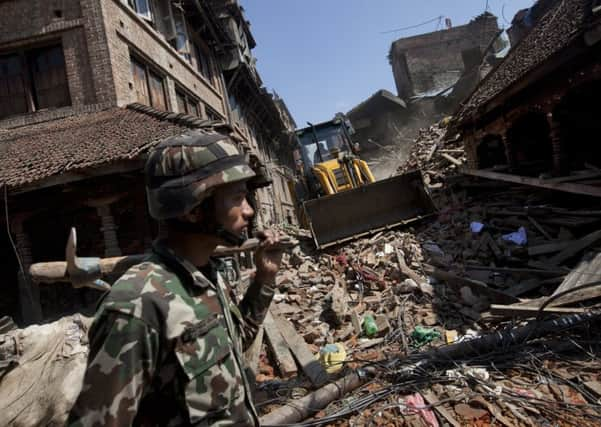4,000 dead amid search for Nepal quake survivors


Amid claims the south Asian country could be reliant on foreign help for years following the disaster, humanitarian volunteers and emergency service crews were continuing to struggle to reach those left cut off or trapped by Saturday’s quake.
Communication problems in the worst-affected areas mean families and friends around the world are still anxiously awaiting news of loved ones, with dozens of British people among those missing.
Advertisement
Hide AdAdvertisement
Hide AdAid workers in the area have reported “huge logistical difficulties” as road closures and communication problems have thwarted efforts.
Leigh Daynes, UK director of medical charity Doctors of the World, said: “Nepal’s health system was vulnerable before the earthquake, especially in rural areas. Now hospitals are utterly incapacitated, infrastructure has been decimated and thousands of people are sleeping on the streets. With monsoon season only weeks away, this is a catastrophe of the highest order and demands an urgent medical response.
“We are facing huge logistical difficulties. As well as roads being closed, aftershocks have prevented planes from landing at Kathmandu airport.
“The challenge now will be the organisation of relief. We also need to give credit to the solidarity of the Nepalese, who were the first to respond and have worked tirelessly for 48 hours.
“Operations have started, but we’re facing a huge lack of material to carry out important medical surgery.”
An RAF plane packed with supplies has been dispatched to the crisis zone, while charity workers, experts and firefighters from across the UK have already begun the search for survivors.
Emergency services in Nepal yesterday said more than 4,000 people have died in the disaster, with many thousands more injured.
The 7.8-magnitude quake struck just before midday on Saturday, sending tremors through the Kathmandu valley and the nearby city of Pokhara.
Advertisement
Hide AdAdvertisement
Hide AdMike Adamson, chief executive of the British Red Cross, said: “As the death toll continues to rise, it is our absolute priority to continue the search and rescue operations and get aid to those left stranded.
“The Red Cross has been working in the Kathmandu valley for the last three years, informing communities of what to do in the event of an earthquake. But though many of the newer buildings have survived, the older infrastructure was not able to withstand the quake.
“Our thoughts go out to all those affected and we urge people to give to our emergency appeal to support Red Cross staff and volunteers.”
Some 67 firefighters from the International Search and Rescue Team were among those helping last night. The team will be able to provide specialised, technical search and rescue assistance in collapsed structures.
This will include locating and rescuing people, canine support, medical teams, engineering, assessing damage and stabilising sites.
The Foreign Office said it had not received reports of any Britons being killed or injured but embassy staff have assisted 200 people.
Tales of escape have begun to emerge from quake survivors, despite widespread disruption to communication lines in Nepal. Climber Alex Staniforth, 19, from Chester, said he was “emotionally trashed” and “very lucky to be alive” after being evacuated to Mount Everest’s base camp.
The quake also set in motion an avalanche which swept the face of Everest, killing at least 17 people and injuring 61, government officials said.
Advertisement
Hide AdAdvertisement
Hide AdNicholas Roxburgh, a 26-year-old PhD student from Ormskirk, Lancashire, described running into the bathroom when the quake struck and finding an exit as soon as possible, before making his way to the street.
In a message to Nepalese president Ram Baran Yadav, the Queen said she was “shocked to hear of the appalling loss of life and injuries” caused by the earthquake, adding that her “thoughts and prayers are with the victims”.
Andrew Lee, a disaster management expert and lecturer with the University of Sheffield, said Nepal would be dependent on aid from countries such as the UK “for years” as it begins a slow recovery from the devastating earthquake. That process could last a decade, he said.
Agencies from across the world are still heading to the country to help in the huge relief effort, but their services will be needed long into the future, he warned.